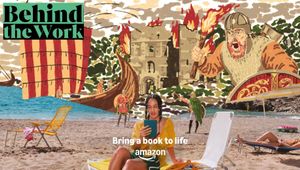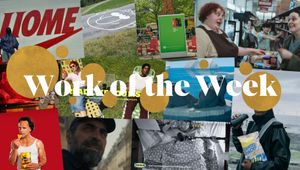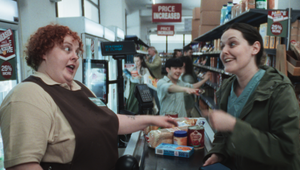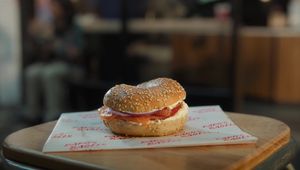
The Director's Balance with Jackie Bao
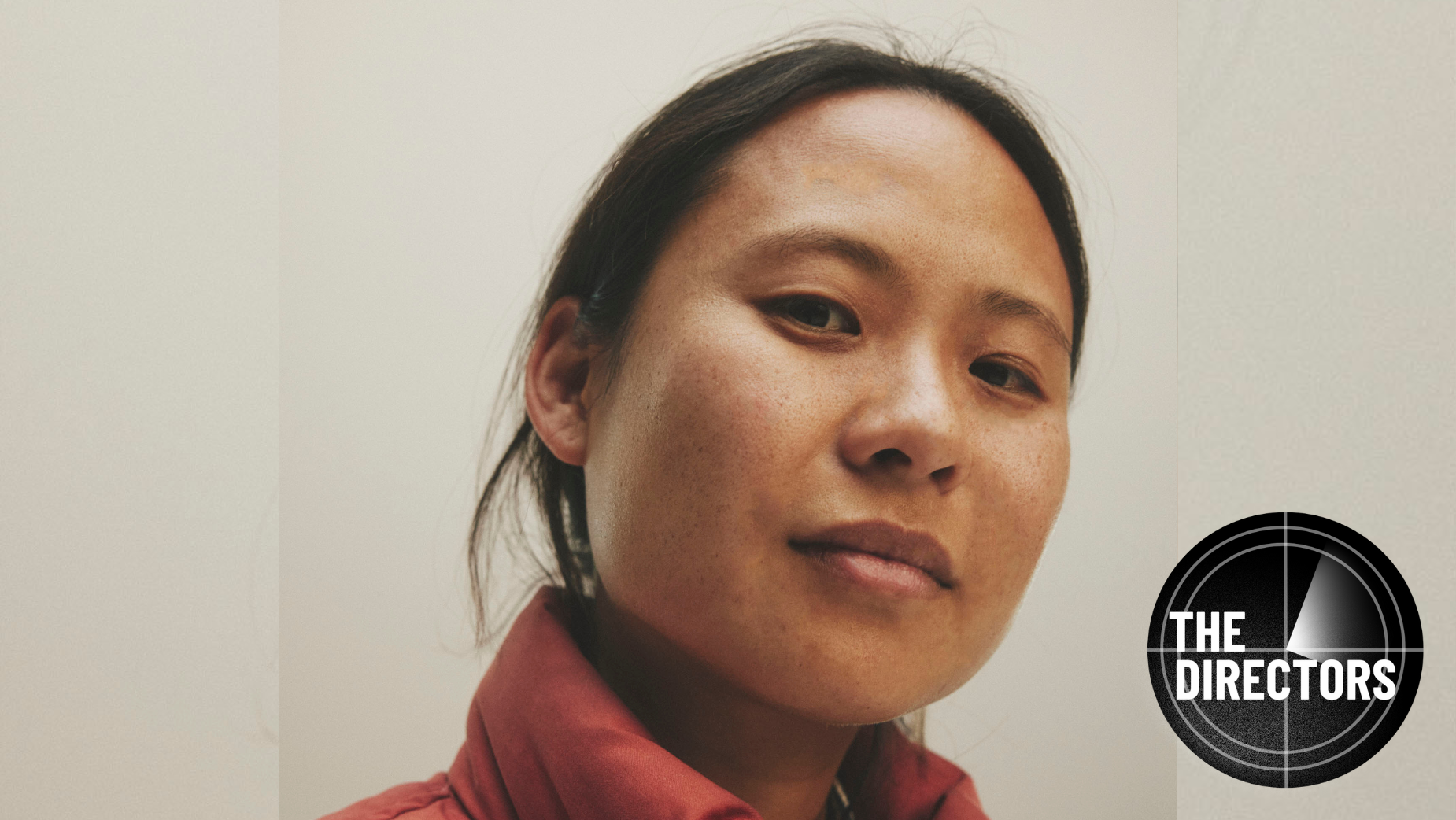
Jackie Bao is a cinematographer and director known for the richness and beauty of her films. Her expert pacing, performance direction, and thoughtful composition convey genuine human emotion and visually authentic scenes.
Born and raised in Los Angeles, Jackie attended Bard College for Photography and Human Rights, Carnegie Mellon, and the American Film Institute for Cinematography. Starting out first as a DP, she has since expanded into directing, bringing her incredible eye for lighting and artful framing to everything she helms.
For Jackie, filmmaking has become a powerful means of exploring an idea and telling stories that generate empathy. She retains a passion for the warmth of film and regularly shoots on 16mm.
Jackie’s first foray into directing was the award-winning film, 'The Myth,' out of Wieden+Kennedy, which focuses on cultural identity, introspective storytelling, and a cinematic aesthetic that uses intimate visuals to explore personal and societal issues. The film was created in reaction to the increased racism and anti-Asian hate crimes in post-Covid 2022.
Produced by Biscuit Filmworks, Jackie was both director and DP for the project, which went on to win Ad of the Year at AdColor, along with accolades from the One Club and Webbys. Her additional brand collaborations include Nike, Ritual, Ralph Lauren, La Mer, and an Olympics spot for Gillette Venus.
Jackie’s narrative films have shown at festivals such as Tribeca and Hollyshorts, with her most recent short, 'Just Kids', premiering at the Asian American International Film Festival. The film was also selected for the Austin Film Festival, Aesthetica, and Flux. Produced by Biscuit Filmworks, the film follows an ambitious Asian-American man shaped by his father’s immigrant experience, who, through an unlikely elevator ride, finds a renewed sense of self.
LBB> What are some upcoming projects that you're excited about? Tell us a bit about them?
Jackie> It’s a personal project, and I'm hoping to shoot it soon. It takes place on a hike between a mother and son, examining her identity between motherhood and self. I was inspired by Gus Van Sant’s film 'Gerry', but wanted to do something more from a female perspective.
I wrote it to be easily made with friends, and it’s something that starts getting deeper into character and scene work.
LBB> What excites you in the advertising industry right now, as a director? Any trends or changes that open new opportunities?
Jackie> You can always do something special by using what you have—a killer location, an amazing actor, or a tight-knit community—but it all starts with having creative collaboration and openness from the beginning. With budgets getting tighter and the pressure to produce more, it can get frustrating. But if we move away from a one-size-fits-all approach, we can take bigger risks and develop more elevated concepts. That shift could really open up freedom and creativity for the craft.
LBB> What elements of a script sets one apart from the other and what sort of scripts get you excited to shoot them?
Jackie> A script is the starting point. A very important starting point. It’s about figuring out what someone is going for—what they want to say. It’s great when there’s a certain openness to the brief, but a clarity of tone and intention. Turning a script into a film, or even a treatment takes so much nuance and personal choice. So it’s great when you can dig in and really put yourself in it. But have confidence that you are understanding the intention and not going totally off the deep end.
LBB> How do you approach creating a treatment for a spot?
Jackie> It starts with feeling and being in tune with that feeling.
I’m naturally sensitive to visuals, so it’s usually the most intuitive way in. Then I curate images and build a visual world that connects with the tone I’m going for. I pull a lot from my own photography archive to keep it personal, but I’m always looking at other photographers and films.
From there, I start going into character. Faces, personalities, again the feeling a character gives you. By the time I finish a treatment, I feel like I’ve already made the film in my head. So many ideas come out of that process.
LBB> If the script is for a brand that you're not familiar with/ don’t have a big affinity with or a market you're new to, how important is it for you to do research and understand that strategic and contextual side of the ad? If it’s important to you, how do you do it?
Jackie> For me, it's important to understand the brief and find clarity in that, but I don't really get into the weeds with the brand research side of things. It’s great when an agency comes with its own insights. And I love to work from a standpoint of collaboration and bounce ideas off each other.
LBB> For you, what is the most important working relationship for a director to have with another person in making an ad? And why?
Jackie> I don’t think there’s one most important relationship. I find my key collaborator varies on each project and sometimes you are really checked in with the creatives and it’s amazing, other times it’s you and the producer, or you and the DP or PD. But I'd say it's usually one of those for me and who you find the most support from.
LBB> What type of work are you most passionate about - is there a particular genre or subject matter or style you are most drawn to?
Jackie> Scripts that have a narrative lift and want to be visually told. I'm fundamentally a narrative thinker with good visual instincts. And I’ll add…if anyone wants to shoot film, that’s always a plus!
LBB> What misconception about you or your work do you most often encounter and why is it wrong?
Jackie> A lot of directing projects that come my way often have a heavier bent to it, and I love telling impactful stories, but I also want to make work that is fun, loose, and oblique. I think it’s been great to be a DP and be able to access some of that joy, and sometimes weirdness, and look to pull more of that into directing as well.
The other misconception is an older school of thought, where you are either a DP or a director, and it’s bad business to do both. I’m of the belief that being both a DP and director makes you a better filmmaker, and definitely a better collaborator.
LBB> Have you ever worked with a cost consultant and if so how have your experiences been?
Jackie> No, but this sounds interesting! I’m curious to learn more.
LBB> What’s the craziest problem you’ve come across in the course of a production – and how did you solve it?
Jackie> Money is always a big factor! And it doesn’t seem to change even as the budgets get bigger. Recently an agency added a rooftop scene, but we didn’t have time to scout or the money for a location. It’s always about trying to figure something out and not just saying no because of money. My producer Pierre and I were just calling friends, family, and EPs. We ended up shooting on my personal roof and it made it into the spot. It's all about making the most of what you have.
LBB> How do you strike the balance between being open/collaborative with the agency and brand client while also protecting the idea?
Jackie> It’s always a balance and that depends so much on each situation. Sometimes, it is challenging an existing idea, by articulating something I think is not working or could be stronger. And hopefully offering a better solution.
But sometimes that also means listening, stepping away from your idea to find something better. Follow the idea, not the ego. Usually, everyone wants the same thing, and it’s keeping that in mind.
LBB> What are your thoughts on opening up the production world to a more diverse pool of talent? Are you open to mentoring and apprenticeships on set?
Jackie> Diversity is good business. There is so much talent, and talent pushes the craft. Mentorship opens up these pathways, and yes, it's on all of us as a community to create those pathways. I feel so lucky to have found real mentorship. I’d feel equally as lucky to be able to support someone else in their path. And at the end of the day, you are building a community you want to be a part of.
LBB> Your work is now presented in so many different formats - to what extent do you keep each in mind while you're working?
Jackie> I think each format has its own opportunities. Beyond framing and aspect ratios consideration, a huge advantage of social media is that you aren’t tied to the traditional :15 or :30 media buyouts. Having time is huge. Huge for telling stories. And that leads to more interesting work!
LBB> What’s your relationship with new technology and, if at all, how do you incorporate future-facing tech into your work?
Jackie> I think AI is the thing everyone is curious about. Grappling with. Personally, I use ChatGPT all the time—it’s been a helpful tool for feedback, notes, and research. I’m a pretty slow writer, so it’s been a lifesaver for that.
But when it comes to AI image-making, I haven’t really wrapped my head around it. There are so many ethical questions, and I’m learning from the people around me by seeing how folks are using it. Right now, ethics aside, the work using AI has not been super compelling to me.
But, for instance, my friend Akin McKenzie—who’s an incredible production designer and artist—has been playing around with AI-generated images and videos, and what he’s making actually feels human and interesting—way more than most of what I’ve seen out there. That gives me hope.
I think that as more people start working with these tools, we’ll start seeing work that is interesting and not just about replacing jobs or maximising efficiency. And hopefully, it’s thoughtful folks. We are all in this together, grappling with how to not be replaced and in a race to the bottom.
LBB> Which pieces of your work do you feel show what you do best – and why?
Jackie> 'The Myth' - Bao’s first foray into directing was the award-winning film, 'The Myth', with Wieden+Kennedy, which focuses on cultural identity, introspective storytelling, and a cinematic aesthetic that uses intimate visuals to explore personal and societal issues.
The film was created in reaction to the increased racism and anti-Asian hate crimes in post-Covid 2022. Produced by Biscuit Filmworks, Bao was both director and DP for the project, which went on to win a Silver Film Lion at Cannes, AdColor’s Ad of The Year, a One Club for Creativity One Screen Award for Craft, a Webby, and a People's Voice Webby.
'Tommy’s' - Bao’s most recent commercial work for Tommy’s, the leading UK pregnancy and baby charity, is a poignant campaign that raises awareness of the lasting emotional impact of losing a baby.
Created with Special London, the spot uses the shadows and reflections of children playing, with one missing its matching child, to illustrate the profound loss experienced by many grieving parents across the UK.
'Just Kids' - Her most recent short, 'Just Kids', is premiering at the Asian American International Film Festival and was also selected for the Austin Film Festival, Aesthetica, and Flux. Produced by Biscuit Filmworks, the film follows an ambitious Asian-American man shaped by his father’s immigrant experience, who, through an unlikely elevator ride, finds a renewed sense of self.









